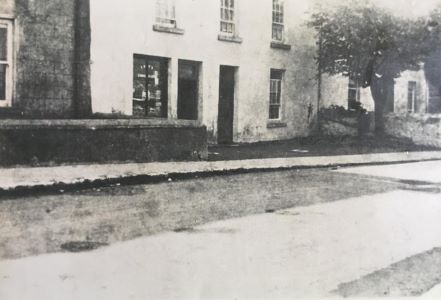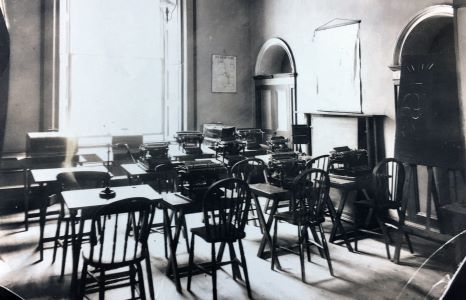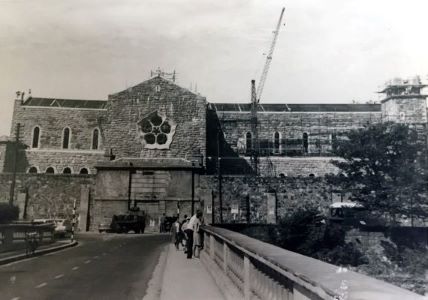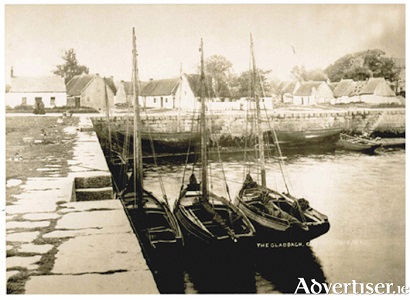Old Galway
SALTHILL VILLAGE, 1920

by Tom Kenny
It is hard to believe that this is what the centre of Salthill village looked like exactly one hundred years ago. The house on the left belonged to a Mr. Kelleher who was a member of the R.I.C. It later became a guest house called the Rockville which eventually expanded into a small hotel and like many such premises in Salthill, it was fully licensed. It had high standards, the porter always wore a white coat and the waitresses wore proper uniforms. The distinguished writer Donal Mac Amhlaigh worked here for a while during the fifties.
A MEMORABLE DAY FOR GALWAY

by Tom Kenny
It was a joy to be a Galway person on the first Sunday of September 1980, the day our hurlers ended years of frustration, perennial underachievement, near misses, noble defeats, controversial defeats, the hard luck stories, the emptiness. There were so many highlights that day; the nervous expectancy as we drove to Dublin; the rumour that Fr. Iggy had been inspirational when saying Mass for the team that morning helped galvanise us all; the palpable nerves before the ball was thrown in; the early goals by P.J. Molloy and Bernie Forde; the terrific battle between Niall McInerney and Joe McKenna; the physicality of the entire match, the bravery of Michael Conneely; the emergence of Eamonn Cregan for Limerick in the second half; Joe McKenna scoring a goal for them with about ten minutes left; the Galway fingernails that were bitten away over the next ten minutes; the deflection of the sliotar over the bar from a last minute Limerick goal attempt; the final whistle, disbelief, a look at the scoreboard, Galway 2 – 15, Limerick 3 – 9, It’s true, we’ve won! The tears.
WALKING THE LINE

by Tom Kenny
‘Walking the Line’ is the title of an important book written by Kevin Brophy which describes his childhood growing up in Renmore Barracks. The ‘Line’ is the path alongside the railway line on the causeway between the barracks and the station, and is seen in our photograph c.1960.
WEST HOUSE, A BRIEF HISTORY

by Tom Kenny
West House was a large detached residence with extensive grounds in Helen Street. It had spacious rooms and belonged for a time to Admiral French.
It was bought by John Lushington Reilly, a customs collector who was a great benefactor of the town and the neighbourhood, especially during the great famine of 1822. Contemporary newspapers give accounts of the balls and receptions held in its rooms and grounds. The Connacht Journal of February 22nd 1827 refers to ‘an entertainment given to the 15th Regiment at West House’.
Galway Cathedral

by Tom Kenny
In 1939, the Government decided there was no longer need for a jail in Galway. Galway County Council then decided to transfer the site of the jail to the Bishop of Galway for a nominal sum as a site for the erection of a cathedral.
AN ACCOUNT BOOK OF THE DOMINICANS IN THE CLADDAGH 1727-1738

by Tom Kenny
In 1698, the Dominican Community in the Claddagh were dispersed and exiled under a general exile of religious orders but within a few years, three of the friars had returned. It was the time of the Penal Laws, but gradually the pressure on these fathers eased, thanks largely to the refusal of the Mayor and Sheriffs to implement the anti-Catholic mandate of the English government. The priests were back in the Claddagh, tolerated by the officials.
Claddagh fishermen

by Tom Kenny
When the Claddagh fishermen worked, they did it with a will, and when not fishing, they were generally found mending their nets. They had the reputation of being so well prepared for sea, that lives were seldom lost when they went fishing. The strand often presented a lively sight at The Claddagh preparatory to the men proceeding to sea. They usually brought with them some oatmeal cakes, potatoes, water, and firing, no spirits of any kind.
WILLIAMSGATE STREET, 1903

by Tom Kenny
The recent Royal Visit of William and Kate prompted us to dig out this photograph of Williamsgate Street taken in August 1903. It was taken just before or after King Edward VII and Queen Alexandra passed through. There were more banners and flags up while they were in the vicinity. The Royals had sailed into Killery Harbour on the royal yacht, then toured Conamara and then travelled by train to Galway. Their visit here was full of pomp and ceremony.
.png)